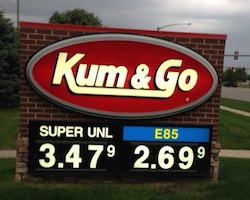 A group that looks at market issues related to vehicles and fuels says there are opportunities to grow the E85 market — but only if E85 prices remain way below regular grade gasoline prices. This news release from the Fuels Institute says also if automakers continue to produce flex-fuel vehicles at historic rates, E85 sales will, at a minimum, double by 2023 and could even see a 20-fold increase in sales over the same time period.
A group that looks at market issues related to vehicles and fuels says there are opportunities to grow the E85 market — but only if E85 prices remain way below regular grade gasoline prices. This news release from the Fuels Institute says also if automakers continue to produce flex-fuel vehicles at historic rates, E85 sales will, at a minimum, double by 2023 and could even see a 20-fold increase in sales over the same time period.
“This report is essential reading for federal regulators who are considering strategies to meet the goals of the Renewable Fuel Standard and for fuel marketers seeking options to diversify their product offer,” said Fuels Institute Executive Director John Eichberger. “It presents an objective analysis of the overall market for E85, including actual retail sales data, and represents a collective effort to identify opportunities and challenges facing this alternative fuel — without taking a position of advocacy.”
Biofuels have experienced remarkable growth over the past 12 years, from 1.75 billion gallons sold in 2001 to 14.54 billion gallons sold in 2013. The vast majority of this growth is from ethanol, particularly E10 fuel that is ubiquitous in most of the country. However, additional E10 sales are constrained by the size of the gasoline market, which has declined since 2007. Therefore, future biofuels sales growth will be highly dependent upon increasing the sale of higher grades of ethanol like E85, a blend of gasoline with 51 to 83% ethanol.
The report says E85 growth will be dependent on more gas stations offering the higher blend of ethanol and making sure there are plenty of flex-fuel vehicles on the road.
“Increasing the E85 station count would improve the potential for additional E85 sales and introduce additional competition to the market. But several other factors — including the relative price of E85 compared to unleaded gasoline and the number of vehicles on the road that can operate on E85 — must also be evaluated to determine the potential E85 market, especially because flex-fuel vehicles can operate on either E85 or gasoline,” said Eichberger.

